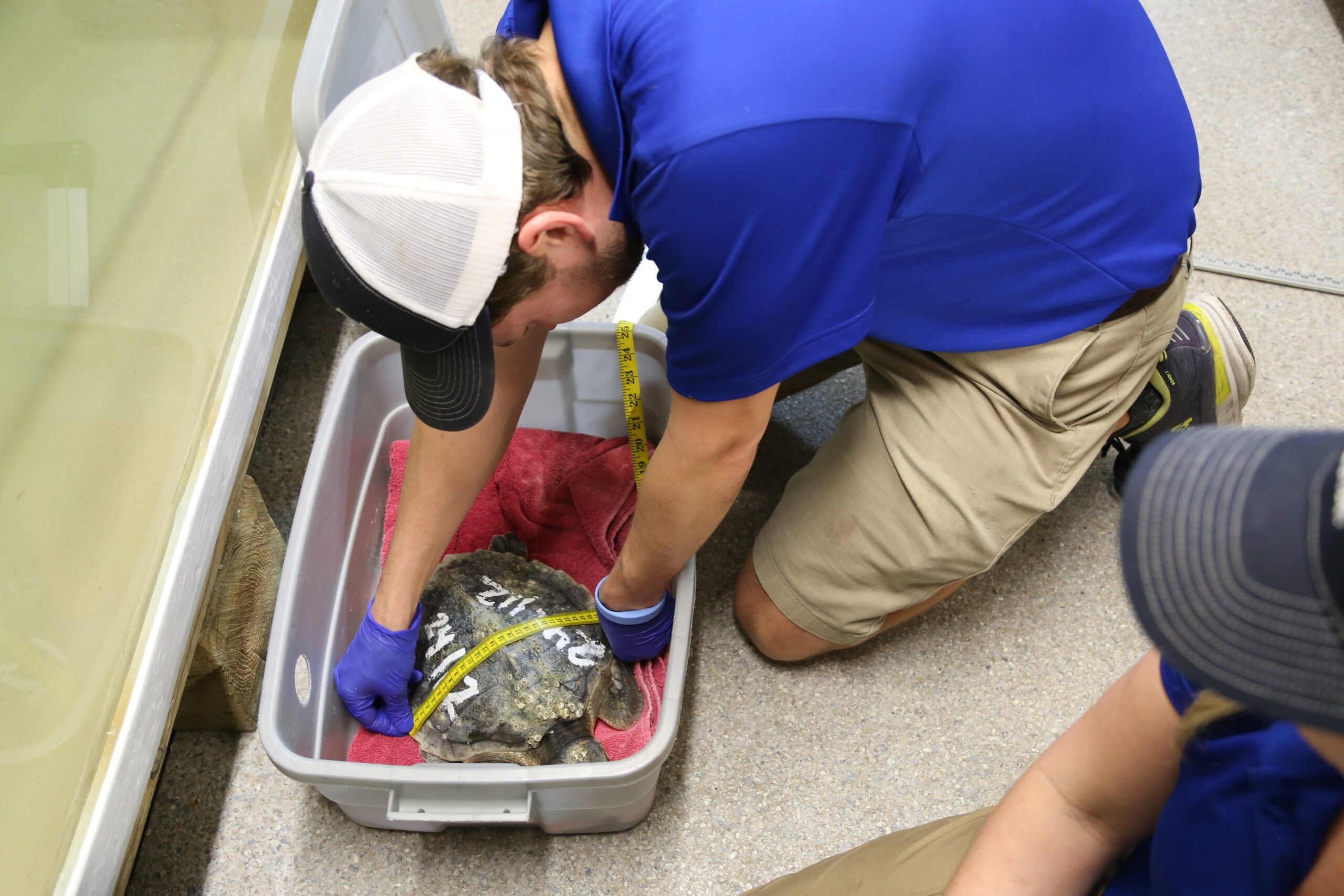
Stunned by the sudden drop in temperatures, six Kemp’s ridley sea turtles are under the professional care of animal experts at the North Carolina Aquarium at Fort Fisher (NCAFF). Upon their arrival Friday, Jan. 26, the team weighed and measured them and observed them swimming in their temporary home behind the scenes at the Aquarium. The Kemp’s ridleys are among 200 cold-stunned sea turtles that have been in the care of the three North Carolina Aquariums in recent weeks.
Cold-stunning causes sea turtles to become very weak and inactive from exposure to cold temperatures. It generally occurs when water temperatures fall below 50 F (10 C).
“Sea turtles are reptiles and are not able to strictly regulate their body temperature like mammals and birds,” said Stephanie Dwyer, assistant husbandry curator, NCAFF. “Cold-stunned sea turtles become lethargic and eventually are unable to swim causing them to float at the surface or wash up on beaches.”
The NC Aquariums at Fort Fisher (NCAFF), Pine Knoll Shores (NCAPKS), and on Roanoke Island (NCARI), also home to the renowned Sea Turtle Assistance and Rehabilitation (STAR) Center, care for weak or injured sea turtles throughout the year.
Locating Cold-Stunned Sea Turtles
Grueling work in frigid temperatures—biologists from Cape Lookout National Seashore and Cape Hatteras National Seashore, the N.C. Wildlife Resources Commission (NCWRC) and volunteers from sea turtle conservation groups like the Network for Endangered Sea Turtles (N.E.S.T.) locate, record, and transport patients to regional facilities.
In the southern part of the state, rescuers take the stranded turtles to the Center for Marine Sciences and Technology (CMAST) in Morehead City for assessment and initial treatment. Once they triage the turtles, the N.C. Aquarium veterinary team and the NCWRC divide the patients among rehabilitation centers along the coast, including the Karen Beasley Sea Turtle Rescue and Rehabilitation Center (KBSTRRC) in Surf City, NCAPKS and NCAFF. From Ocracoke north, stranded turtles move through a staging site on Hatteras Island for documentation and then directly to the STAR Center at NCRI, whose team, under the supervision of the veterinary team completes Initial assessments and treatments.
“Rehabilitation for a cold-stunned sea turtle can take anywhere from a couple of weeks to several months, depending on the health status of the turtle when they arrive. We work closely with our veterinary team to administer individual care as each turtle is affected differently by cold-stunning,” said Ryan McAlarney, husbandry curator, NCAFF.
Rehabilitating the Cold-stunned Sea Turtles
During rehabilitation, the animal care team slowly warms up the turtles, and ensures they can swim and lift their heads comfortably out of the water to breathe. The team offers them a variety of food and administers fluids, antibiotics, eye drops, and wound care prescribed by the veterinary team. Once the veterinary team clears the turtles for release, they place a small microchip in the front flipper of each turtle. The chip can provide information about where the turtle was last seen and how much they have grown.
Releasing the Rehabilitated Sea Turtles
Winter releases require partnerships with boats that can release the turtles offshore, typically, in warm water near the Gulf Stream, 70 F (21 C) or above. Crews from Duke Marine Laboratory in Beaufort, the U.S. Coast Guard Stations at Cape Hatteras and Fort Macon, and private fishing vessels have helped release rehabilitated turtles.
NCWRC leads the work to rescue and rehabilitate sea turtles and collaborates with several federal, state, and private organizations including the NC Aquariums; CMAST; North Carolina State University College of Veterinary Medicine; Cape Lookout National Seashore; KBSTRRC; N.E.S.T.; Cape Hatteras National Seashore; U.S. Fish and Wildlife Service; National Marine Fisheries Service; and National Oceanic and Atmospheric Administration (NOAA).
What You Can Do
If you see a turtle in the water or on the beach this time of year that is not moving or sluggish, do not push them back into the water or attempt to transport them yourself. Please call the Sea Turtle Stranding Hotline to report the turtle, and they will give instructions and send someone to retrieve and document the turtle.
- South of Ocracoke Island, call 252-241-7367.
- Ocracoke & Hatteras Island, call Cape Hatteras National Seashore at 252-216-6892.
- Oregon Inlet and north, call N.E.S.T. at 252-441-8622.


